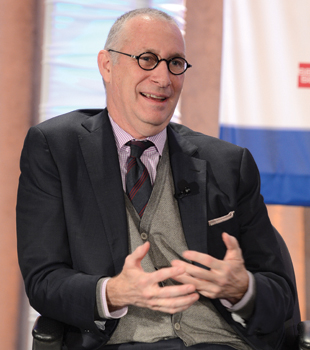Who will be the creative mind that comes up with new names for the two most cumbersome and impenetrable concepts in sports media: “TV Everywhere” and “authentication”?
Whenever someone blurts out TV Everywhere in our editorial meetings, my mind instantly wanders to a sun-brimmed beach, taking me to somewhere else I’d so rather be than that current state. It’s even worse for authentication: I feel like we’re telling readers about a military movement led by a dictatorial regime.
So it was nice to learn recently that I’m not alone in my agonizing frustration with two of the ugliest terms that have seeped into our industry jargon in some time. Then again, what should I expect: The terms are from the cable industry, the same creative forces that brought us such user-friendly and fun acronyms as MSOs, VoIP, MVPD and ITV — good Lord, someone stop them!
At our Sports Media & Technology Conference in New York earlier this month, there was finally consensus that we need to junk “authentication” and start over. The term flat out scares people. It’s not welcoming nor inclusive and does not offer a vibe of user-friendly. Authentication? More like repudiation. Panelist after panelist chimed in, with Turner Sports President David Levy shaking his head at the term, and Comcast Cable’s Matt Strauss saying the cable industry hasn’t helped itself by calling the process authentication. Strauss: “It doesn’t exactly roll off the tongue.” Thank you! So now that we all agree we hate the term, let’s all think of better names as we move forward.
■ BUT IT’S MORE THAN A NAME: Outside of a simpler name for having consumers approved for access (see how I didn’t even use the evil word!), there was a constant refrain at the conference for better marketing of the process as well as for TV Everywhere. It reminded me of the days when league executives criticized the cable industry for the poor marketing of sports tiers, which is what they believed was the reason for their lack of adoption. Comcast’s Strauss acknowledged that the effort around TV Everywhere will require heavy marketing so that consumers know what it is and what content they can access. “We can’t assume people are going to understand this,” he said. “It will require meaningful marketing. When customers understand the value, it will be consumed.” NBC’s Gary Zenkel said the process of signing up also has to improve. “You’re going to lose people every time you require them to put in some personal information,” he said. “When the industry gets to a point where that information is not necessary or minimized, people are going to blow through the gates.”
■ STANDING UP FOR THE VALUE OF CABLE: Another theme that emerged over the two days in New York is that sports media executives are tired of the talk that sports rights are driving up the cost of pay TV, and they are fighting back. Panelists throughout the event defended the value proposition of the monthly pay-TV bill. Tim Brosnan, MLB executive vice president of business, called on everyone in attendance to “stop apologizing” for the cost of “the cable bill.” Instead, he told a story comparing an upcoming Saturday night, when he’d be looking to catch a new movie, to spending a recent evening at home instead. “This weekend, I’ll go out to the movies, and if I take my four kids, maybe we’ll get out of there for around $100,” he said. “That’s on a Saturday night for around three hours. And everyone complains about the cable bill, and we apologize for it, but I think that we should stop apologizing for it. Last Saturday, I was able to sit on my couch and watch three hours of college football on various networks, flipping back and forth. Unbelievably good entertainment and it kept me on the couch — and that was one day out of 30 that I pay a bill for.” Turner’s Levy also sounded off, saying, “The industry has done a poor job in saying what the value has been for the cable business. It’s good value for $80. And, by the way, TV Everywhere will make it even more valuable.”
 |
ESPN’s Skipper said the NBA’s strong position today supports its decision to move to cable 10 years ago.
Photo by: MARC BRYAN-BROWN
|
■ ALWAYS FEAR THE NO-NOS: Cord cutting was viewed as an issue on the fringe, one to watch, but not having a business impact yet. Levy summed it up well by saying, “What we’re more concerned about what we call the ‘nevers’ — those that are never going to get on cable. And we do believe that’s going to start happening with the younger generations. I’m not worried about the cord cutting; I’m worried about the ‘nevers.’”
■ ANTICIPATE WHAT’S NEXT: There was a lot of discussion about being able to anticipate the future when it comes to the media business — a skill easier said than done. Former NFL Commissioner Paul Tagliabue touched on it in talking about how properties can build a successful media strategy and maximize rights fees in the future by fostering competition and investing in technology. “You can’t just focus on what your rights fee is going to be or what your audience is going to be,” he said. “You’ve got to, as a rights holder, invest in technology, directly or indirectly, and invest in competition. … As long as you keep investing in innovation, technology and competition, you’ll be OK if you have a product that drives that.” In talking about the differences between being on cable and being on broadcast TV, NBA Commissioner David Stern recalled how the league was hammered by media when it increased its presence on cable 10 years ago, including for its All-Star Game — that critics claimed the product would be marginalized and out of the mainstream. The always perceptive John Skipper, president of ESPN, offered one of my favorite lines of the conference, saying, “The notion that the NBA gave up anything to come to ESPN and TNT is laughable. Look at the position of the league now. You’re not giving up audience by moving into what’s happening next. You actually lose audience by trying to hold onto what happened before.”
Abraham D. Madkour can be reached at amadkour@sportsbusinessjournal.com.





